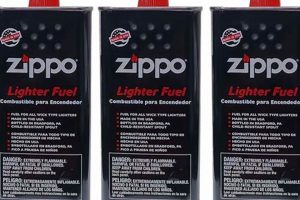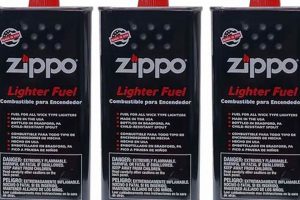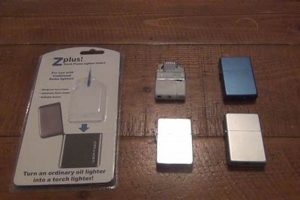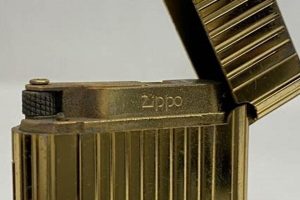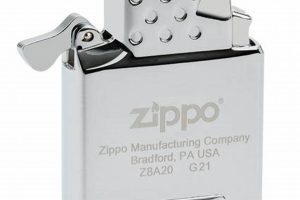Zippo fluid, typically naphtha, and butane are distinct fuels designed for different lighter mechanisms. Naphtha, a highly volatile and flammable liquid, fuels lighters with wicks, relying on capillary action and vaporization for combustion. Butane, a pressurized gas, is used in lighters with valves and specialized jets. Attempting to use naphtha in a butane lighter can clog the delicate gas delivery system, potentially rendering the lighter inoperable. Conversely, a wick-based lighter will not function with butane.
Understanding the incompatibility of these fuels is critical for maintaining lighter functionality and safety. Using the incorrect fuel can lead to malfunctions, leaks, and potentially dangerous situations. The distinction arose with the advent of butane lighters in the mid-20th century, offering a cleaner, more adjustable flame compared to traditional fluid lighters. Each fuel type has its own advantages; naphtha lighters are often more wind-resistant, while butane lighters provide consistent flame height and are typically refillable.
This fundamental difference in fuel types informs the design, operation, and maintenance of each respective lighter. The following sections will delve deeper into the specific properties of naphtha and butane, exploring their individual benefits and drawbacks, as well as best practices for handling and maintaining both types of lighters.
Tips for Fueling Lighters
Proper lighter maintenance requires using the correct fuel. Choosing the wrong fuel can damage the lighter and create safety hazards.
Tip 1: Identify the Lighter Type: Determine whether the lighter uses a wick (indicating a fluid lighter) or a valve and jet (indicating a butane lighter). This is the crucial first step in selecting the correct fuel.
Tip 2: Choose the Correct Fuel: Use naphtha-based lighter fluid exclusively for wick-based lighters. Use butane gas exclusively for butane lighters. Never interchange these fuels.
Tip 3: Consult the Manufacturer’s Instructions: Refer to the lighter’s packaging or manufacturer’s website for specific fuel recommendations and safety precautions. This information provides tailored guidance for the specific lighter model.
Tip 4: Proper Fueling Technique: When refueling a wick lighter, allow the cotton packing to fully absorb the fluid. Avoid overfilling. For butane lighters, use the appropriate butane refill nozzle and follow the instructions for filling.
Tip 5: Store Fuel Safely: Store lighter fluid and butane refills in a cool, dry place away from open flames and excessive heat. Always keep these fuels out of reach of children.
Tip 6: Observe Lighter Performance: After refueling, observe the lighter’s performance. If the lighter malfunctions or produces an unusual flame, discontinue use and consult a professional or the manufacturer.
Following these guidelines ensures optimal lighter performance and minimizes risks associated with improper fuel usage. Correct fuel selection and proper maintenance are essential for safe and reliable lighter operation.
By understanding the distinctions between lighter types and fuels, users can maintain their lighters effectively and prevent potential hazards. The concluding section will reiterate the importance of safe lighter practices and offer additional resources for further information.
1. Incompatible Fuels
Incompatible fuels represent a critical aspect of the “can you use Zippo fluid for butane lighters” question. The incompatibility stems from the fundamental differences in the chemical composition and combustion properties of naphtha (Zippo fluid) and butane. Naphtha, a mixture of hydrocarbons, requires a wick to draw the liquid fuel up for vaporization and ignition. Butane, a liquefied gas under pressure, relies on a precise valve and jet system for controlled release and ignition. Attempting to introduce naphtha into a butane lighter’s pressurized system results in clogging and malfunction, rendering the lighter unusable. Conversely, butane fails to saturate the wick material in a Zippo-style lighter, preventing proper combustion.
This incompatibility extends beyond mere functionality. Introducing the wrong fuel can create safety hazards. Naphtha in a butane lighter can lead to leaks, uncontrolled burning, and potential fire risks. The pressurized system of a butane lighter is not designed to handle the viscous nature of naphtha, leading to pressure buildup and potential rupture. Similarly, attempting to ignite butane in a wick-based lighter can result in uneven flames, fuel spills, and increased fire risk. For instance, using naphtha in a butane lighter designed for camping could lead to a malfunctioning stove at a critical moment, compromising safety and potentially leading to hazardous situations.
Understanding fuel incompatibility is essential for safe and effective lighter operation. It underscores the importance of using the correct fuel for the intended lighter type. Consulting manufacturer guidelines and adhering to safety precautions are crucial to prevent malfunctions, damage, and potential hazards. Recognizing the distinct requirements of each fuel type ensures optimal lighter performance and minimizes risks associated with improper fuel usage. The practical implications of using incompatible fuels can range from simple inconvenience to significant safety concerns, reinforcing the importance of this understanding for all lighter users.
2. Different Mechanisms
Distinct operating mechanisms underlie the incompatibility of Zippo fluid (naphtha) and butane lighters. Understanding these differences is paramount for safe and effective lighter use. This section explores the contrasting functionalities of these lighter types, highlighting the reasons behind their specific fuel requirements.
- Wick-Based System (Naphtha)
Zippo-style lighters utilize a wick-based system saturated with naphtha. The wick draws the liquid fuel upwards via capillary action. A flint and steel mechanism ignites the vaporized naphtha, producing a flame. This system requires a fuel that can effectively saturate the wick and vaporize readily at ambient temperatures. Examples include traditional Zippo lighters and other similar wick-based designs. Using butane in this system would be ineffective as it wouldn’t saturate the wick.
- Pressurized System (Butane)
Butane lighters employ a pressurized system. Butane, stored as a liquid under pressure, is released as a gas through a valve and ignited by a spark or other ignition source. The controlled release and precise jetting mechanism produce a consistent flame. Examples include common disposable and refillable butane lighters, often used for lighting cigarettes, candles, or gas stoves. Introducing naphtha into this system would clog the delicate valve and jet assembly, rendering the lighter non-functional.
- Fuel Delivery
Fuel delivery differs significantly between the two systems. Naphtha relies on passive capillary action through the wick, while butane relies on controlled release through a pressurized valve. This fundamental difference dictates the type of fuel each lighter can utilize. The wick’s porous nature readily absorbs naphtha, while the butane lighter’s precision-engineered valve and nozzle system requires the consistent flow of pressurized gas.
- Ignition Source
While both lighter types require an ignition source, the methods differ. Wick-based lighters typically employ a flint and steel mechanism, generating a spark that ignites the naphtha vapor. Butane lighters often utilize piezoelectric ignition systems or other electronic means to generate a spark. These different ignition systems are tailored to the specific fuel and delivery mechanism of each lighter type.
The contrasting mechanisms of naphtha and butane lighters underscore the importance of using the correct fuel. Attempting to interchange fuels not only renders the lighter inoperable but also poses potential safety risks. The distinct designs optimize the combustion process for each specific fuel type, ensuring efficient and safe operation. Understanding these fundamental differences reinforces the “can you use Zippo fluid for butane lighters” query with a definitive negative response. The differing fuel delivery systems, ignition sources, and overall design highlight the inherent incompatibility of these two fuel types.
3. Risk of Damage
Attempting to use Zippo fluid (naphtha) in a butane lighter presents a significant risk of damage to the lighter’s internal components. Naphtha, a viscous liquid, is incompatible with the delicate mechanisms designed for pressurized butane gas. The narrow passages and precise tolerances of the butane lighter’s valve system are easily clogged by naphtha’s thicker consistency. This blockage disrupts fuel flow, rendering the lighter non-functional. Furthermore, naphtha’s corrosive properties can degrade seals and O-rings within the butane lighter, leading to leaks and further malfunction. For instance, introducing naphtha into a refillable butane torch, often used for culinary or crafting purposes, can permanently obstruct the fine jet, rendering the tool useless. This underscores the practical implications of fuel incompatibility and the potential for costly repairs or replacements.
The risk of damage extends beyond mere clogging. Naphtha residue can accumulate within the butane lighter’s fuel reservoir, contaminating any remaining butane. This contamination can lead to inconsistent flame performance, sputtering, and difficulty igniting. In some cases, the mixture of naphtha and butane can create an unstable combustion environment, increasing the risk of flare-ups or uncontrolled burning. Consider a scenario where a camper attempts to refill their butane stove with naphtha. The resulting malfunction could compromise their ability to cook food or boil water, impacting their safety and well-being in a wilderness setting.
Understanding the risk of damage associated with using incompatible fuels is crucial for maintaining lighter functionality and ensuring user safety. This knowledge emphasizes the importance of adhering to manufacturer recommendations and using the correct fuel type for each specific lighter design. The potential consequences of improper fuel use range from minor inconvenience and financial loss due to damaged equipment to more serious safety hazards associated with malfunctioning lighters. The practical implications underscore the need for clear and accessible information regarding fuel compatibility and safe lighter practices.
4. Safety Hazard
Using Zippo fluid (naphtha) in butane lighters presents significant safety hazards. The incompatibility of these fuels creates several risks, ranging from immediate dangers like fire and explosion to long-term health concerns due to chemical exposure. Understanding these hazards is paramount for responsible lighter usage.
- Fire and Explosion
Attempting to fill a butane lighter with naphtha can lead to immediate fire and explosion hazards. Naphtha is highly volatile and flammable, and introducing it into a butane lighter’s pressurized environment can create an unstable mixture prone to ignition. Leaks, spills, or even the act of attempting to ignite the lighter can result in uncontrolled flames and potential explosions. A real-world example includes instances where individuals have mistakenly used naphtha in butane lighters, leading to significant burns and property damage. The rapid vaporization of naphtha combined with the pressurized environment of a butane lighter creates a dangerous cocktail with a high risk of ignition.
- Burns and Injuries
The improper use of naphtha in butane lighters poses a substantial risk of burns and other injuries. Naphtha’s low flash point and high flammability increase the likelihood of accidental ignition, leading to burns on hands, face, and other body parts. Furthermore, explosions resulting from the volatile mixture can cause severe injuries, including shrapnel wounds and burns from projected debris. Emergency room visits due to lighter-related injuries often involve improper fuel usage, highlighting the tangible risks associated with this practice.
- Chemical Exposure
Both naphtha and butane pose health risks through chemical exposure. Inhaling naphtha fumes can cause respiratory irritation, dizziness, and nausea. Prolonged exposure can lead to more severe health issues, including central nervous system depression and organ damage. Similarly, butane inhalation can cause drowsiness, headaches, and cardiac arrhythmias. While butane lighters are designed to minimize butane release during normal operation, improper filling or leaks can increase exposure risks. Understanding the potential health impacts of these chemicals underscores the importance of safe handling and proper ventilation.
- Long-Term Health Risks
Chronic exposure to naphtha, through repeated misuse in butane lighters, can lead to long-term health complications. Studies have linked chronic naphtha exposure to neurological disorders, liver and kidney damage, and an increased risk of certain cancers. While occasional misuse may not pose immediate severe risks, repeated exposure increases the likelihood of developing these long-term health problems. Understanding the cumulative effects of chemical exposure reinforces the importance of avoiding any misuse of flammable liquids like naphtha.
These safety hazards underscore the critical importance of never using Zippo fluid (naphtha) in a butane lighter. The potential for fire, explosion, burns, and long-term health complications makes this practice extremely dangerous. Adhering to manufacturer instructions, using the correct fuel type, and practicing safe handling procedures are essential for mitigating these risks and ensuring responsible lighter usage. The potential consequences of improper fuel use extend far beyond mere inconvenience, impacting personal safety and potentially leading to severe and lasting health problems.
5. Use Correct Fuel
Fuel selection is paramount when addressing the query “can you use Zippo fluid for butane lighters.” The correct fuel ensures safe and optimal lighter performance, while incorrect fuel usage can lead to malfunctions, damage, and potentially hazardous situations. This section explores the critical facets of proper fuel selection, emphasizing its connection to the central theme of fuel compatibility.
- Fuel Type Compatibility
Lighter design dictates fuel compatibility. Zippo lighters utilize a wick-based system requiring liquid naphtha, while butane lighters utilize a pressurized system requiring butane gas. Using Zippo fluid in a butane lighter or vice-versa renders the lighter inoperable and poses safety risks. For example, attempting to use butane in a kerosene lamp, while not directly related to lighters, illustrates the broader principle of fuel-device compatibility and the potential consequences of mismatches.
- Performance and Functionality
Correct fuel usage ensures optimal lighter performance. Naphtha facilitates the wick’s saturation and vaporization in Zippo lighters, producing a consistent flame. Butane, in its pressurized form, provides a controlled and adjustable flame in butane lighters. Using the wrong fuel compromises functionality, leading to inconsistent flames, sputtering, or complete failure to ignite. A butane lighter filled with naphtha, for example, will likely clog and fail to produce a flame, illustrating the direct impact of fuel choice on functionality.
- Safety Considerations
Safety is a critical aspect of fuel selection. Using incompatible fuels can lead to leaks, uncontrolled burning, and potential explosions. Naphtha in a pressurized butane lighter can create a volatile and dangerous situation. Similarly, attempting to ignite butane in a wick lighter can result in fuel spills and uncontrolled flames. A real-world example includes incidents where incorrect fuel usage has led to lighter explosions causing burns and property damage, emphasizing the serious safety implications of improper fuel selection.
- Lighter Maintenance and Longevity
Using the correct fuel contributes to lighter longevity. Incorrect fuel can damage internal components, leading to costly repairs or replacements. Naphtha can clog the delicate valves and jets of a butane lighter, while butane is ineffective in saturating a wick. Proper fuel usage ensures the lighter functions as intended, minimizing wear and tear and extending its lifespan. Regularly using the correct fuel, along with proper cleaning and maintenance, can significantly prolong the life of a lighter, maximizing its utility and minimizing waste.
These facets highlight the crucial connection between “Use correct fuel” and the question “can you use Zippo fluid for butane lighters.” Proper fuel selection is not merely a recommendation but a fundamental requirement for safe and effective lighter operation. Ignoring fuel compatibility compromises functionality, jeopardizes safety, and reduces lighter lifespan. The consequences of incorrect fuel usage range from minor inconveniences to serious safety hazards, emphasizing the importance of understanding and adhering to proper fuel selection guidelines. This understanding ensures safe and responsible lighter use while maximizing the lighter’s intended functionality and lifespan.
6. Consult Instructions
Consulting manufacturer instructions forms a critical component in understanding why Zippo fluid should not be used in butane lighters. Instructions provide explicit guidance regarding the appropriate fuel type for a specific lighter model. This information directly addresses the “can you use Zippo fluid for butane lighters” question by specifying the designed fuel compatibility. Ignoring these instructions increases the risk of malfunction, damage, and potential safety hazards. For instance, a butane lighter’s instructions will invariably specify the use of butane fuel and caution against using any other flammable liquids, including Zippo fluid. This explicit guidance protects users from the potential consequences of fuel incompatibility, such as clogging, leakage, or fire.
The practical significance of consulting instructions extends beyond mere fuel compatibility. Instructions often detail proper filling procedures, safety precautions, and maintenance guidelines. These details ensure optimal lighter performance and minimize risks. For example, instructions might specify the correct angle for inserting a butane refill nozzle or advise against overfilling a Zippo lighter. These seemingly minor details play a crucial role in safe and effective lighter operation. Failure to consult instructions and adhere to these guidelines can lead to suboptimal performance, reduced lifespan, and potentially hazardous situations. A real-world example could involve a user overfilling a butane lighter, leading to fuel leakage and an increased risk of fire. Consulting instructions mitigates such risks by providing clear and specific guidance.
In conclusion, consulting instructions is essential for safe and effective lighter use. It directly addresses the “can you use Zippo fluid for butane lighters” question by specifying the correct fuel type and providing critical safety and operational guidelines. Ignoring these instructions increases the risk of damage, malfunction, and potential harm. The practical implications of this understanding range from preserving lighter functionality to preventing serious safety hazards. Consulting instructions empowers users with the knowledge necessary for responsible and informed lighter usage, promoting safety and maximizing the lifespan of their lighters. This practice underscores the broader theme of responsible product usage and the importance of adhering to manufacturer guidelines for optimal performance and safety.
Frequently Asked Questions
This FAQ section addresses common queries and misconceptions related to lighter fuel usage, specifically regarding the use of Zippo fluid in butane lighters. Clear and accurate information is crucial for safe and responsible lighter handling.
Question 1: What happens if Zippo fluid is used in a butane lighter?
Using Zippo fluid (naphtha) in a butane lighter will clog the fuel delivery system, rendering the lighter inoperable. The viscous naphtha obstructs the fine jets and valves designed for pressurized butane gas. Additionally, naphtha can damage seals and O-rings, leading to leaks and potential safety hazards.
Question 2: Can any type of lighter fluid be used in any lighter?
No, lighter fluids are not interchangeable. Lighters are designed for specific fuel types. Using the incorrect fuel can damage the lighter, compromise its functionality, and create safety risks.
Question 3: Are butane and Zippo fluid interchangeable?
Butane and Zippo fluid (naphtha) are not interchangeable. They have different chemical compositions and combustion properties. Using the wrong fuel type will damage the lighter and create potential safety hazards.
Question 4: Is it safe to mix different types of lighter fluid?
Mixing different lighter fluids, such as naphtha and butane, is extremely dangerous and should never be attempted. The resulting mixture can be unstable, leading to unpredictable combustion, potential explosions, and increased fire risk.
Question 5: Why does my butane lighter not work after I tried using Zippo fluid?
The Zippo fluid (naphtha) has likely clogged the delicate gas delivery system of the butane lighter. The lighter may require professional repair or replacement.
Question 6: Where can one find the correct fuel type for a specific lighter?
The correct fuel type is typically indicated on the lighter itself or its original packaging. Manufacturer websites also provide this information, along with detailed safety guidelines and usage instructions.
Understanding the distinctions between fuel types and lighter designs is essential for safe and responsible lighter use. Always consult the manufacturer’s instructions and use the recommended fuel type to ensure optimal performance and minimize risks.
The subsequent sections will delve into specific examples of lighter types and their corresponding fuels, further clarifying the principles discussed in this FAQ.
Conclusion
Exploration of the question “Can you use Zippo fluid for butane lighters?” reveals a critical incompatibility. Butane lighters, utilizing a pressurized system with precise jets and valves, require butane fuel. Zippo fluid, a naphtha-based liquid fuel, is designed for wick-based lighters and is wholly unsuitable for butane lighters. Attempting to use Zippo fluid in a butane lighter risks clogging the fuel delivery system, leading to malfunction, potential leakage, and significant safety hazards, including fire and explosion. Conversely, butane is ineffective in wick-based systems, failing to saturate the wick and produce a consistent flame. Fuel compatibility is paramount for safe and effective lighter operation.
Safe lighter usage necessitates understanding these fundamental distinctions. Consulting manufacturer instructions and adhering to recommended fuel types are crucial for mitigating risks and ensuring proper lighter function. Ignoring these guidelines compromises not only the lighter’s functionality and lifespan but also user safety. Promoting awareness regarding fuel compatibility remains essential for preventing accidents and fostering responsible lighter handling practices. Continued education on this topic strengthens individual safety and contributes to a broader culture of responsible product usage.


